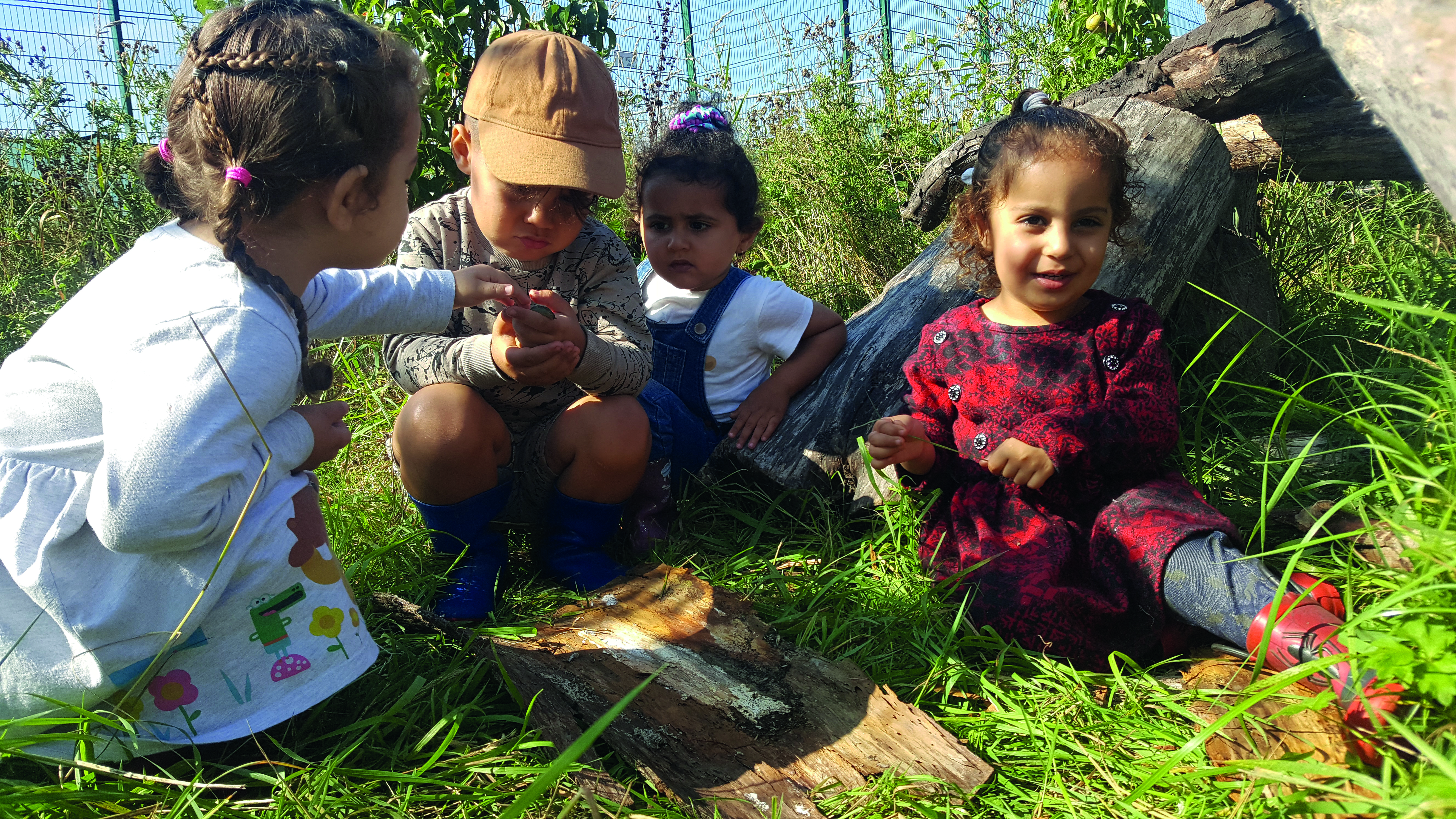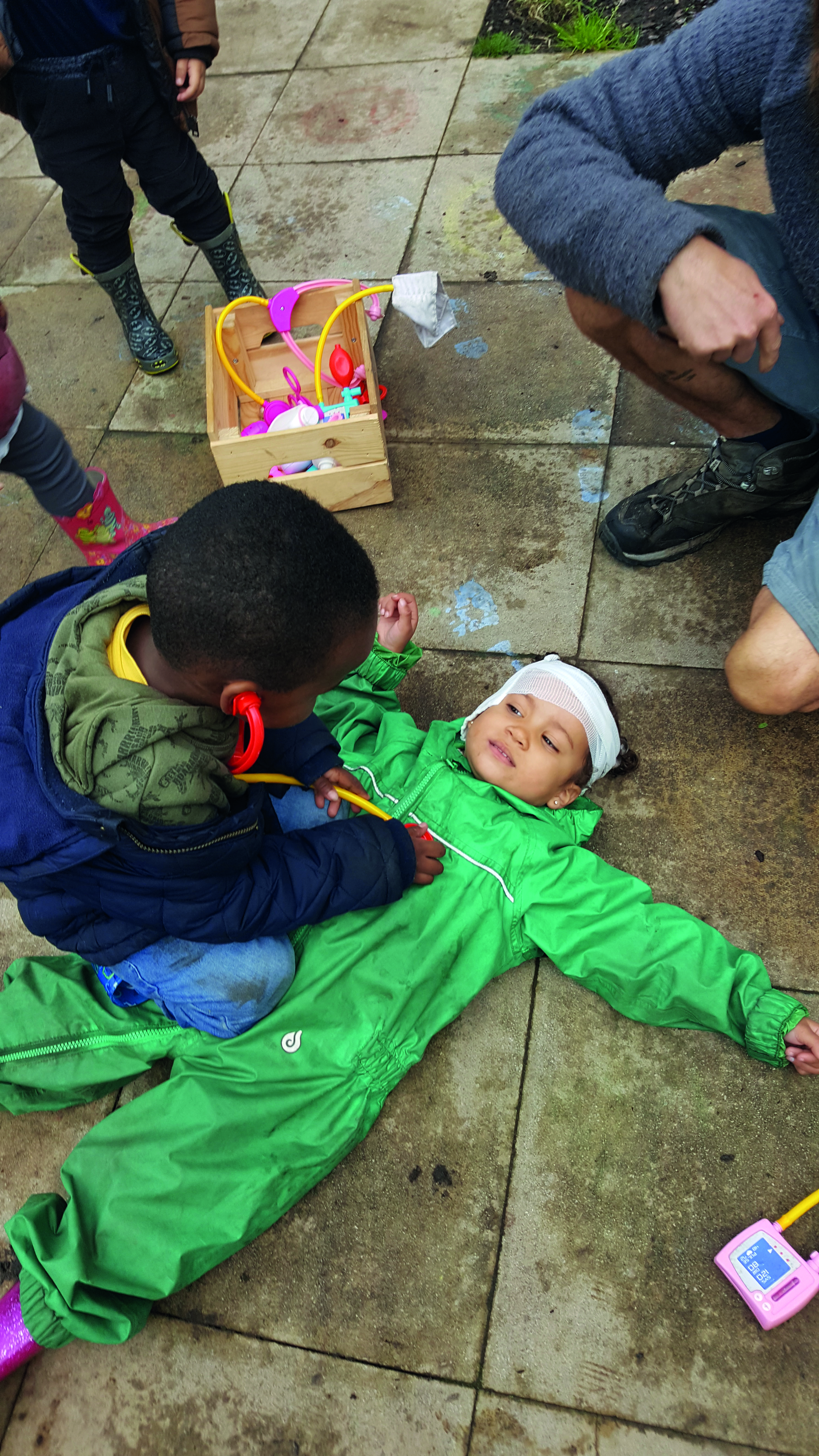
In the midst of a neighbourhood with one of the highest child poverty rates in the UK, reduced life expectancy and educational achievement and skill levels far below average is the welcoming oasis of the Greenhouse Multi-Cultural Play and Arts Project.
The charity was established in inner-city Toxteth, Liverpool in 1997 with the aim of giving local children and young people – many with English as an additional language (EAL) – better chances. The project started with an out-of-school club and opened a pre-school six years ago. It is rated Outstanding and achieved Pre-School of the Year in the Nursery World Awards 2021. Its aims are:
- to provide outstanding early years education
- to provide stimulating and thought-provoking learning experiences
- to promote collaborative working with parents and carers
- to celebrate diversity and support all members of the learning community.
‘We are in a community that is constantly changing, it is inundated with newcomers, refugee families, asylum seekers and some of Eastern Europe’s poorest migrants,’ says chief executive Debbie Wright.
‘The Greenhouse Project aims to provide programmes in a safe non-judgemental environment that will enable children, young people and their families to gain confidence, make meaningful connections and develop a sense of belonging. As individuals they will develop socially, emotionally, physically and intellectually, they will become more healthy, resilient, creative and independent learners with increased feelings of wellbeing and happiness and with the quality of their lives and overall life prospects substantially improved.’
SELF-ESTEEM
A key part of the project’s curriculum is building children’s self-esteem and confidence. Early years manager Jael Casas says, ‘When people are born here, they already have limited chances because of the cycle of poverty and unemployment. Like many urban areas there is a high prevalence of drugs, criminal and anti-social behaviour, so what children are exposed to are negative role models and a potential future with reduced life prospects. We build children’s self-esteem so that they have confidence and are not ashamed of their skin colour or culture. When they come out from under our wings we want them to go to school with the confidence to learn and grow.’
Their philosophy is ‘staff not stuff’. ‘We do not value resources because they alone do not provide learning and development of children. It’s the staff who provide that, so we invest in them,’ explains Jael. ‘Many come from our community and we put our finances into high-quality training and encourage them to pursue higher qualifications.
‘We have a staff member who was born in Toxteth, attended the Greenhouse out-of-school club and is now about to become deputy manager – that’s what we’re about. We want to give anyone who comes into contact with us the tools to change and the opportunity to be the best they can. We will move heaven and earth to find ways to fund training.’

PARENTAL NEEDS
Parent partnership is regarded as one of the main pillars to the success of the project. Pre-school staff build strong relationships with families, who can often feel isolated. Staff are trained and supported in understanding the needs, challenges and context of the family situation to better assess and address issues (see Case study).
Many of the fathers with EAL pick up English quickly at work, but culturally, mothers tend to struggle because they often stay at home. One way staff support them is by signposting to ESOL classes that coincide with their children’s pre-school sessions.
‘EAL is a barrier to so many things and we spend a lot of time supporting families to fill out forms for housing, college, benefits, immigration – I have attended Home Office interviews,’ says Jael.
‘We also help with housing issues such as overcrowding, problems with jobs and how to access benefits because they can’t fill in the forms. We can’t just tell parents that it is time to apply for a school place, we have to make appointments with the families to help them apply.’
As part of a focused plan to support children’s literacy, staff introduced a Storybarn experience where children and families can enjoy an imaginative play space together and tell stories. ‘The opportunity of visiting the Storybarn, together with their children, has meant so much to the parents,’ says Jael. ‘Some of our families are going through difficult situations at home, and after visiting the Storybarn, some parents said for one day they were able to forget their problems and to enjoy a lovely time with their child.’
Shared Reading sessions have also been introduced to share skills with parents. ‘Staff may choose a poem with a theme that is relevant, such as changing lives or welcoming a new family member. Parents can then talk to each other about what they like or feel about the poem and this helps them to feel more related to each other because they have things in common,’ explains Jael. ‘Parents can open up about what the poem made them feel or if they can relate it to their life. They say that they feel so connected to other parents and now they can go back to life feeling more connected and supported.’
During lockdowns, staff devised a rota to visit each family every week. ‘Many of our families do not have the skills to use technology,’ says Jael. ‘We’d cycle to each family to check they were OK and give them information – some would not know if they were allowed to go out because they did not know the rule changes. We also worked with other organisations to give them food and bring activities. For example, we developed a library on wheels and encouraged children to make pictures or puppets about the books.
‘Parents were very thankful for the activities and they were also grateful to have a chat.’

PULLING TOGETHER
Many of the Greenhouse Project’s toys and resources are donated or made, such as building climbing frames from pallets. They also receive financial donations from other charities, including the Liverpool Football Club Foundation.
The focus on literacy was such a success that staff set up a library for children to take books home. Children’s experiences during lockdown made staff realise that they lacked the skills to interact with technology, so donated funding was used to purchase tech toys – remote control cars, recordable pegs, torches, interactive boards, headphones and walkie talkies – to address this.
The pre-school has a large outdoor area which has been increasingly used since the start of the pandemic, including Forest School sessions. ‘Culturally many families are not used to the British weather and do not want their children to play outdoors,’ says Jael. ‘But many of the children got so lonely during lockdown that their parents are now happy for them to play outdoors whatever the weather.’
Staff are always looking for ways to improve and achieve more. ‘This is an oasis where people have the opportunity to change. It’s not a glamorous place, but when you walk in, the walls are full of staff photos and children’s artwork, crafts the children have created and all cultures are represented. It’s a building full of amazing people and amazing opportunities.’
CASE STUDY: family in need
Staff picked up on a range of issues while registering the youngest of four children into the pre-school. The family were asylum seekers with EAL and relied on the eldest children to communicate. One parent was diagnosed severely mentally unwell and the other was suffering from limiting physical conditions. They had recently moved to Toxteth following racial harassment in another area and were suffering from isolation, stigma and fear.
Through careful discussions, staff found that they were unable to meet basic food, hygiene and clothing needs. Plaster was crumbling off their internal walls and the youngest child was eating it. The oldest child was acting as an interpreter to raise this and other concerns with the housing association.
The child’s key person and pre-school safeguarding officer stepped in to co-ordinate professionals working around the family. They also accessed local networks for support.
After only one year, the family had developed positive friendships within the community. They were able to cover their basic needs and displayed increased emotional wellbeing. Professional support helped them to be granted refugee status and most housing issues were addressed. Importantly, the parents had increased confidence to face future challenges.
Nursery World Awards 2022
- Entries open for this year’s awards on 7 February. Visit the Nursery World website to find out more: https://www.nurseryworld.co.uk/awards









